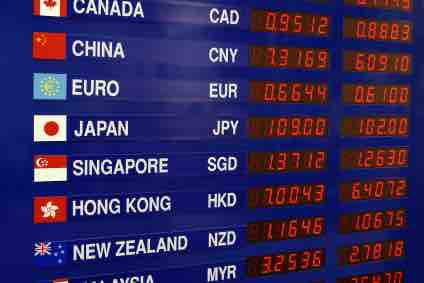In finance, an exchange rate (also known as the foreign-exchange rate, forex rate or FX rate) between two currencies is the rate at which one currency will be exchanged for another. It is also regarded as the value of one country's currency in terms of another currency. For example, an interbank exchange rate of 91 Japanese yen (JPY, ¥) to the United States dollar (US$) means that ¥91 will be exchanged for each US$1 or that US$1 will be exchanged for each ¥91. Exchange rates are determined in the foreign exchange market, which is open to a wide range of different types of buyers and sellers where currency trading is continuous (24 hours a day except weekends, i.e., trading from 20:15 GMT on Sunday until 22:00 GMT Friday). The spot exchange rate refers to the current exchange rate. The forward exchange rate refers to an exchange rate that is quoted and traded today but for delivery and payment on a specific future date .

Exchange Rate
In finance, an exchange rate (also known as the foreign-exchange rate, forex rate or FX rate) between two currencies is the rate at which one currency will be exchanged for another.
In a typical foreign exchange transaction, a party purchases a quantity of one currency by paying a quantity of another currency. The modern foreign exchange market began forming during the 1970s after three decades of government restrictions on foreign exchange transactions (the Bretton Woods system of monetary management established the rules for commercial and financial relations among the world's major industrial states after World War II), when countries gradually switched to floating exchange rates from the previous exchange rate regime, which remained fixed as per the Bretton Woods system.
The foreign exchange market (forex, FX, or currency market) is a form of exchange for the global decentralized trading of international currencies. Financial centers around the world function as anchors of trading between a wide range of different types of buyers and sellers around the clock, with the exception of weekends. The foreign exchange market determines the relative values of different currencies.
The foreign exchange market assists international trade and investment by enabling currency conversion. For example, it permits a business in the United States to import goods from the European Union member states, especially Eurozone members, and pay Euros, even though its income is in United States dollars. It also supports direct speculation in the value of currencies, and the carry trade, speculation based on the interest rate differential between two currencies.